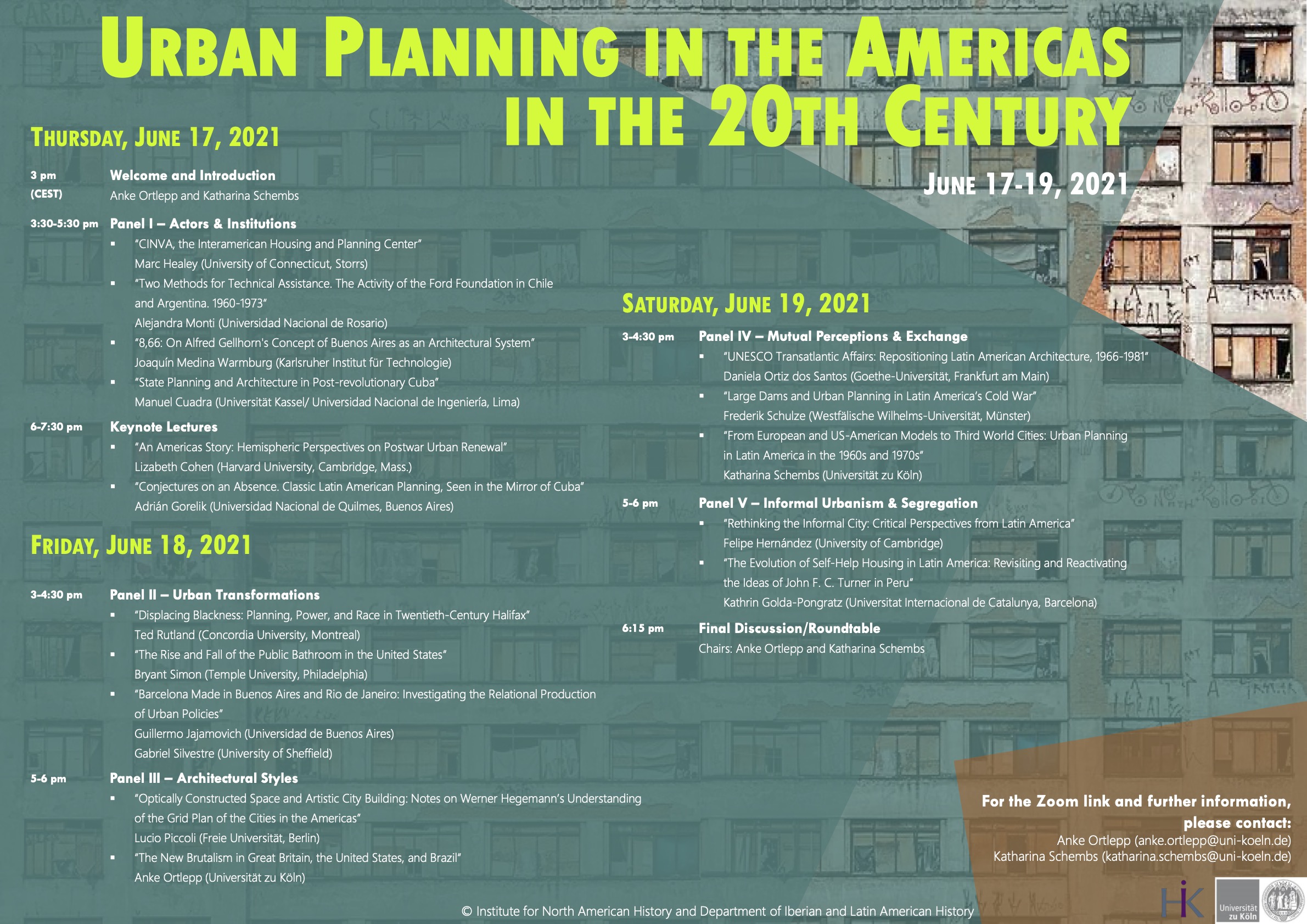Sa 19.06.2021
3pm (CEST)
• online
Konferenz
UNESCO Transatlantic Affairs : Repositioning Latin American Architecture, 1966-1981
Daniela Ortiz dos Santos
Paper presentation at the International Conference
Urban Planning in the Americas in the 20th Century
17-19 June 2021
At the end of the second decade of the new millennium cities in the Americas are confronted with similar challenges. Energy consumption, climate balance, population density and the growth of megacities, gentrification and poverty, traffic and infrastructure as well as the privatization of public space are problems, that urban planners face in Vancouver, New York, Los Angeles, Miami, Mexico City, La Paz, São Paulo and Buenos Aires. Based on the conviction that the built urban environment in urban spaces is crucial for the cohabitation of its different dwellers – humans, animals, plants – they come up with scenarios in which sustainability plays an increasingly important role. Not only do different local actors collaborate, ranging from planners, architects and designers to traffic experts, property developers and citizens’ groups. There is also increasing translocal and transnational exchange in urban planning, that brings together professionals from North, Central and South America.
The international conference “Urban planning in the Americas in the 20th century” pursues two aims: First, it historicizes the challenges for urban planning taking into account the 20th century. Second, it focusses on the whole of the American continent – an innovative perspective that apart from subjects as slavery, migration or indigenous cultures has rarely been taken. Research on urban planning and architecture in the Americas is limited to a few comparative studies, although historians’ interest in the built environment has grown. The conference therefore aims at applying the spatial and material turn to the history of the Americas, centering on the planning and design of urban spaces.
The conference will highlight differences and similarities in urban development in the Americas, focussing on personal exchange between North and Latin American urban planners in the 20th century. Key questions deal with the role of different actors in urban planning (municipalities, the state, property developer, architects, residents, citizens’ groups, international organizations) as well as with design and aesthetics and sustainability in urban renewal.
Conference organized by Anke Ortlepp & Katharina Schembs, Institute for North American History and Department of Iberian and Latin American History, Universität zu Köln
Further Information: https://www.hsozkult.de/event/id/event-97882?title=urban-planning-in-the-americas-in-the-20th-century
Programm
Thursday, June 17, 2021
3 pm
(CEST)
Welcome and Introduction
Anke Ortlepp & Katharina Schembs
3:30-5:30 pm
Panel I – Actors & Institutions
– “CINVA, the Interamerican Housing and Planning Center”
Marc Healey (University of Connecticut, Storrs)
– “Two Methods for Technical Assistance. The Activity of the Ford Foundation in Chile and Argentina. 1960-1973“
Alejandra Monti (Universidad Nacional de Rosario)
– “8,66: On Alfred Gellhorn’s Concept of Buenos Aires as an Architectural System”
Joaquín Medina Warmburg (Karlsruher Institut für Technologie)
– “State Planning and Architecture in Post-revolutionary Cuba”
Manuel Cuadra (Universität Kassel/ Universidad Nacional de Ingeniería, Lima)
6-7:30 pm
Keynote Lectures
– “An Americas Story: Hemispheric Perspectives on Postwar Urban Renewal”
Lizabeth Cohen (Harvard University, Cambridge, Mass.)
– “Conjectures on an Absence. Classic Latin American planning, seen in the Mirror of Cuba”
Adrián Gorelik (Universidad Nacional de Quilmes, Buenos Aires)
Friday, June 18, 2021
3-4:30 pm
Panel II – Urban Transformations
– “Displacing Blackness: Planning, Power, and Race in Twentieth-Century Halifax”
Ted Rutland (Concordia University, Montreal)
– “The Rise and Fall of the Public Bathroom in the United States”
Bryant Simon (Temple University, Philadelphia)
– “Barcelona made in Buenos Aires and Rio de Janeiro: Investigating the Relational Production of Urban Policies”
Guillermo Jajamovich (Universidad de Buenos Aires)
Gabriel Silvestre (University of Sheffield)
5-6 pm
Panel III – Architectural Styles
– “Optically Constructed Space and Artistic City Building: Notes on Werner Hegemann´s Understanding of the Grid Plan of the Cities in the Americas”
Lucio Piccoli (Freie Universität, Berlin)
– “The New Brutalism in Great Britain, the United States, and Brazil“
Anke Ortlepp (Universität zu Köln)
Saturday, June 19, 2021
3-4:30 pm
Panel IV – Mutual Perceptions & Exchange
– “UNESCO Transatlantic Affairs: Repositioning Latin American Architecture, 1966-1981“
Daniela Ortiz dos Santos (Goethe-Universität, Frankfurt am Main)
– “Large Dams and Urban Planning in Latin America’s Cold War”
Frederik Schulze (Westfälische Wilhelms-Universität, Münster)
– “From European and US-American Models to Third World Cities: Urban Planning in Latin America in the 1960s and 1970s“
Katharina Schembs (Universität zu Köln)
5-6 pm
Panel V – Informal Urbanism & Segregation
– “Rethinking the Informal City: Critical Perspectives from Latin America”
Felipe Hernández (University of Cambridge)
– “The Evolution of Self-Help Housing in Latin America: Revisiting and Reactivating the Ideas of John F. C. Turner in Peru“
Kathrin Golda-Pongratz (Universitat Internacional de Catalunya, Barcelona)
6:15 pm
Final Discussion/ Roundtable
Chairs: Anke Ortlepp and Katharina Schembs
For the zoom-link and further information, please contact:
Anke Ortlepp (anke.ortlepp@uni-koeln.de)
Katharina Schembs (katharina.schembs@uni-koeln.de)
Contact
For the zoom-link please contact:
anke.ortlepp@uni-koeln de
katharina.schembs@uni-koeln.de
